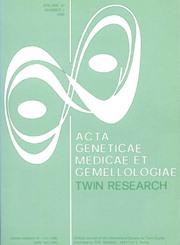Crossref Citations
This article has been cited by the following publications. This list is generated based on data provided by
Crossref.
McKinney, Mary K.
Tuber, Steven B.
and
Downey, Jennifer I.
1996.
Multifetal Pregnancy Reduction: Psychodynamic Implications.
Psychiatry,
Vol. 59,
Issue. 4,
p.
393.
McMAHON, SANDRA
and
DODD, BARBARA
1997.
A comparison of the expressive communication skills of triplet, twin and singleton children.
International Journal of Language & Communication Disorders,
Vol. 32,
Issue. 3,
p.
328.
Åkerman, B. Alin
Hovmöller, M.
and
Thomassen, P. A.
1997.
The Challenges of Expecting, Delivering and Rearing Triplets.
Acta geneticae medicae et gemellologiae: twin research,
Vol. 46,
Issue. 02,
p.
81.
Leonard,, Linda G.
1998.
Depression and Anxiety Disorders During Multiple Pregnancy and Parenthood.
Journal of Obstetric, Gynecologic & Neonatal Nursing,
Vol. 27,
Issue. 3,
p.
329.
Holditch‐Davis, Diane
Roberts, Dia
and
Sandelowski, Margarete
1999.
Early parental interactions with and perceptions of multiple birth infants.
Journal of Advanced Nursing,
Vol. 30,
Issue. 1,
p.
200.
McWhinnie, Alexina
2000.
Euphoria or despair? Coping with multiple births from ART: What patients don't tell the clinics.
Human Fertility,
Vol. 3,
Issue. 1,
p.
20.
Weigel, Daniel J.
Auxier, C. R.
and
Frye, Todd M.
2000.
Multiple-Birthing Trends: Impact on Couples and Families.
The Family Journal,
Vol. 8,
Issue. 4,
p.
380.
Garel, M
Salobir, C
Lelong, N
and
Blondel, B
2000.
Les mères de triplés et leurs enfants : évolution de quatre à sept ans après la naissance.
Gynécologie Obstétrique & Fertilité,
Vol. 28,
Issue. 11,
p.
792.
Leonard, Linda G
2000.
Breastfeeding Triplets: The At‐Home Experience.
Public Health Nursing,
Vol. 17,
Issue. 3,
p.
211.
Leonard, Linda G.
2002.
Breastfeeding Higher Order Multiples: Enhancing Support During the Postpartum Hospitalization Period.
Journal of Human Lactation,
Vol. 18,
Issue. 4,
p.
386.
Beck, Cheryl Tatano
2002.
A Meta-Synthesis of Qualitative Research.
MCN, The American Journal of Maternal/Child Nursing,
Vol. 27,
Issue. 4,
p.
214.
Fisher, Jane
and
Stocky, Andrew
2003.
Maternal Perinatal Mental Health and Multiple Births: Implications for Practice.
Twin Research,
Vol. 6,
Issue. 6,
p.
506.
Beck, Cheryl Tatano
2003.
Seeing the Forest for the Trees: A Qualitative Synthesis Project.
Journal of Nursing Education,
Vol. 42,
Issue. 7,
p.
318.
Ellison, Marcia A
and
Hall, Janet E
2003.
Social stigma and compounded losses: quality-of-life issues for multiple-birth families.
Fertility and Sterility,
Vol. 80,
Issue. 2,
p.
405.
Feldman, Ruth
Eidelman, Arthur I.
and
Rotenberg, Noa
2004.
Parenting Stress, Infant Emotion Regulation, Maternal Sensitivity, and the Cognitive Development of Triplets: A Model for Parent and Child Influences in a Unique Ecology.
Child Development,
Vol. 75,
Issue. 6,
p.
1774.
Feldman, Ruth
and
Eidelman, Arthur I.
2004.
Parent-Infant Synchrony and the Social-Emotional Development of Triplets..
Developmental Psychology,
Vol. 40,
Issue. 6,
p.
1133.
Feldman, Ruth
and
Eidelman, Arthur I.
2005.
Does a Triplet Birth Pose a Special Risk for Infant Development? Assessing Cognitive Development in Relation to Intrauterine Growth and Mother-Infant Interaction Across the First 2 Years.
Pediatrics,
Vol. 115,
Issue. 2,
p.
443.
Feldman, Ruth
2007.
Parent–infant synchrony and the construction of shared timing; physiological precursors, developmental outcomes, and risk conditions.
Journal of Child Psychology and Psychiatry,
Vol. 48,
Issue. 3-4,
p.
329.
Nurse, Sharon
and
Kenner, Carole
2011.
Multiples in the Newborn Intensive Care Unit: Parents' and Nurses' Perspectives.
Newborn and Infant Nursing Reviews,
Vol. 11,
Issue. 4,
p.
175.
Roca-de Bes, Montserrat
Gutierrez-Maldonado, José
and
Gris-Martínez, José M.
2011.
Comparative study of the psychosocial risks associated with families with multiple births resulting from assisted reproductive technology (ART) and without ART.
Fertility and Sterility,
Vol. 96,
Issue. 1,
p.
170.


